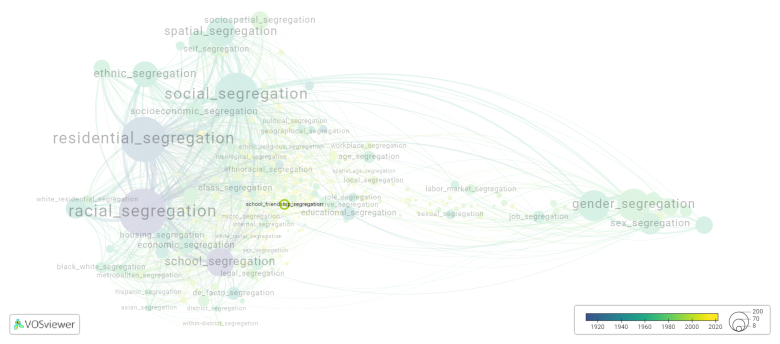School friendship segregation: Difference between revisions
(Creating page) |
(Creating page) |
||
| Line 18: | Line 18: | ||
[[File:school_friendship_segregation.png|780x780px]] | [[File:school_friendship_segregation.png|780x780px]] | ||
Visualization based on the [[How_to_cite_Segregation_Wiki| research]] | |||
For the complete network of associated segregation forms, see: | For the complete network of associated segregation forms, see: | ||
year of publication https://tinyurl.com/2235lkhw | * First year of publication https://tinyurl.com/2235lkhw | ||
Louvain clusters https://tinyurl.com/2d8wg5n3 | * Louvain clusters https://tinyurl.com/2d8wg5n3 | ||
* Betweenness centrality https://tinyurl.com/223udk5r | |||
* Disciplines where segregation forms first appeared https://tinyurl.com/244d8unz | |||
==References== | ==References== | ||
==Notes== | ==Notes== | ||
Revision as of 13:41, 3 October 2024
Date and country of first publication[1]
2006
United States
Definition
School friendship segregation refers to the tendency for students to form friendships primarily within their own racial, ethnic, or cultural groups. This can lead to social isolation and limited cross-cultural interaction among students, ultimately reinforcing stereotypes and prejudice.
There are several factors that contribute to school friendship segregation. One factor is socialization, where students often feel more comfortable and secure in familiar social groups that share similar backgrounds and experiences. Peer pressure and the existence of cliques can also play a role, as students may fear rejection or exclusion if they try to befriend those outside of their own group.
The consequences of school friendship segregation can be detrimental, both for individuals and for society as a whole. For students, it can lead to a lack of exposure to diversity, limiting their understanding and appreciation of different cultures and perspectives. This can perpetuate stereotypes, prejudice, and intolerance. It can also lead to lower academic achievement and increased social isolation.
Addressing school friendship segregation requires a multi-faceted approach. Schools should promote diversity and inclusivity through curriculum content and extracurricular activities that celebrate different cultures and encourage cross-cultural interaction. Creating opportunities for students to interact with peers from different backgrounds, such as through multicultural clubs or buddy programs, can also be effective. Additionally, fostering an inclusive and accepting school climate, where students feel valued and respected regardless of their background, can help break down barriers and promote friendship and integration across diverse groups.
See also
Related segregation forms
School friendship segregation is frequently discussed in the literature with the following segregation forms:
racial residential segregation, residential segregation

Visualization based on the research
For the complete network of associated segregation forms, see:
- First year of publication https://tinyurl.com/2235lkhw
- Louvain clusters https://tinyurl.com/2d8wg5n3
- Betweenness centrality https://tinyurl.com/223udk5r
- Disciplines where segregation forms first appeared https://tinyurl.com/244d8unz
References
Notes
- ↑ Date and country of first publication as informed by the Scopus database (December 2023).
At its current state, this definition has been generated by a Large Language Model (LLM) so far without review by an independent researcher or a member of the curating team of segregation experts that keep the Segregation Wiki online. While we strive for accuracy, we cannot guarantee its reliability, completeness and timeliness. Please use this content with caution and verify information as needed. Also, feel free to improve on the definition as you see fit, including the use of references and other informational resources. We value your input in enhancing the quality and accuracy of the definitions of segregation forms collectively offered in the Segregation Wiki ©.
School friendship segregation appears in the following literature
Mouw T., Entwisle B. (2006). Residential segregation and interracial friendship in schools. American Journal of Sociology, 112(2), 394-441. https://doi.org/10.1086/506415
